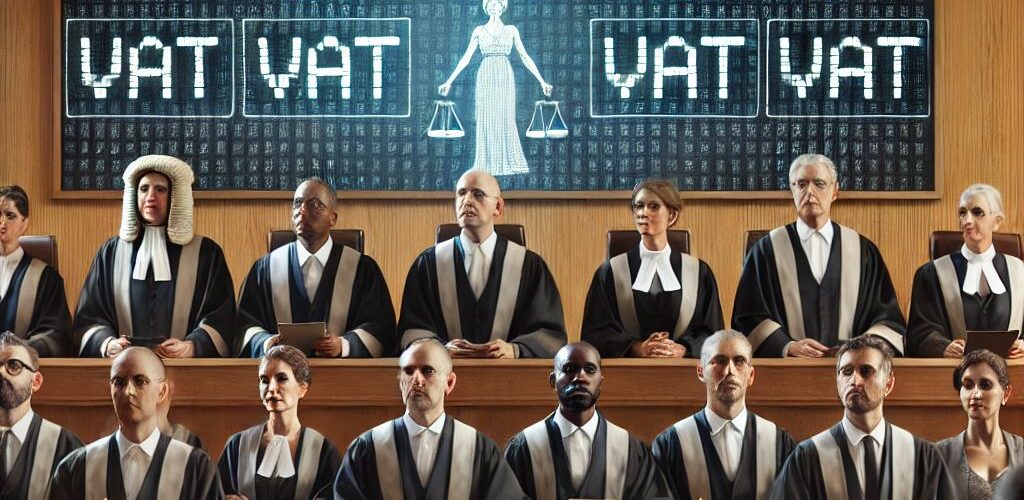Listen HERE to the podcast version on SPOTIFY
Based on the most visited posts of ECJ Cases on www.VATupdate.com in 2024
And the winner is an ECJ Case which has not yet been decided …
- C-726/23 (Arcomet Towercranes) – Questions – Are Transfer Pricing Settlement invoices a Supply of Services?
- C-533/22 (Adient) – No Fixed establishment solely on the basis that the two companies belong to the same group
- C-60/23 (Digital Charging Solutions) – Charging electricity for electric vehicles at public points is a supply of goods
- C-676/22 (B2 Energy) – No exemption on intra-EU supplies if it can not proven that the recipient is a taxable person
- C-606/22 (Dyrektor Izby Administracji Skarbowej w Bydgoszczy ) – VAT due can be adjusted if excessive VAT Rates are applied
- C-475/23 (Voestalpine Giesserei Linz) – Right to deduct VAT if goods purchased are provided to a subcontractor for the subcontractor’s taxable transactions
- C-377/23 (Sancra) – Order – VAT assumed to be included in wrongly 0% rated invoice
- C-537/22 (Global Ink Trade) – Deduction of VAT in case of a missing additional evidence/fictitious transactions
- C-341/22 (Feudi di San Gregorio Aziende Agricole SpA) – VAT deduction even if costs are not proportionate to the income
- C-68/23 (Finanzamt O) – Judgment – Definition of single-purpose and multi-purpose vouchers
More details
- C-726/23 (Arcomet Towercranes)
- The case questions whether Transfer Pricing Settlement invoices should be classified as a supply of services under VAT law.
- It addresses the implications of such classification for VAT treatment and the obligations of the parties involved.
- The outcome may affect how transfer pricing arrangements are reported and taxed across jurisdictions.
- C-533/22 (Adient)
- The court ruled that a company cannot be deemed to have a fixed establishment solely because it is part of a corporate group.
- This decision clarifies the criteria for establishing a fixed establishment for VAT purposes, focusing on the necessity of physical presence and operational independence.
- It has implications for multinational companies regarding VAT registration and compliance across different EU member states.
- C-60/23 (Digital Charging Solutions)
- The ruling determined that charging electricity for electric vehicles at public charging points qualifies as a supply of goods.
- This classification impacts how VAT is applied to the sale of electricity in the context of electric vehicle infrastructure.
- It may influence regulatory frameworks governing electric vehicle charging services and their VAT treatment.
- C-676/22 (B2 Energy)
- The court found that no exemption on intra-EU supplies applies if it cannot be proven that the recipient is a taxable person.
- This decision emphasizes the importance of proper documentation and verification in intra-community transactions.
- It underscores the responsibility of suppliers to ensure that their customers meet the criteria for VAT exemptions.
- C-606/22 (Dyrektor Izby Administracji Skarbowej w Bydgoszczy)
- The case affirmed that VAT due can be adjusted if excessive VAT rates were applied in previous transactions.
- This ruling allows for corrections to be made to VAT liabilities, ensuring that businesses are not penalized for overpayments.
- It highlights the importance of accurate VAT rate application and the potential for refunds in cases of overcharging.
- C-475/23 (Voestalpine Giesserei Linz)
- The court ruled that a business has the right to deduct VAT on goods supplied to a subcontractor for their taxable transactions.
- This decision clarifies the conditions under which VAT deductions are permitted, focusing on the final use of goods in taxable activities.
- It reinforces the principle that VAT should follow the economic activity and ultimate use of goods.
- C-377/23 (Sancra)
- The ruling addressed the assumption that VAT is included in an incorrectly 0% rated invoice.
- It highlights the importance of proper VAT rating and the consequences of misclassification on tax obligations.
- The case may influence how businesses approach invoicing and VAT compliance to avoid future disputes.
- C-537/22 (Global Ink Trade)
- The court ruled on the deduction of VAT in cases where additional evidence is missing or transactions are deemed fictitious.
- It emphasizes the need for proper documentation to support VAT claims and the risks associated with inadequate proof.
- This ruling may have implications for businesses involved in complex supply chains and their VAT deduction rights.
- C-341/22 (Feudi di San Gregorio Aziende Agricole SpA)
- The court confirmed that VAT deductions are allowed even if costs are not proportionate to the income generated.
- This decision supports the right of businesses to reclaim VAT on costs incurred, regardless of their direct correlation to revenue.
- It may affect how companies evaluate their VAT positions and the expenses they claim.
- C-68/23 (Finanzamt O)
- The judgment clarified the definitions of single-purpose and multi-purpose vouchers under VAT law.
- This distinction is significant for understanding the VAT treatment of different types of vouchers and their implications for tax compliance.
- The ruling may influence how businesses structure their voucher programs and their associated VAT accounting practices.
See also















